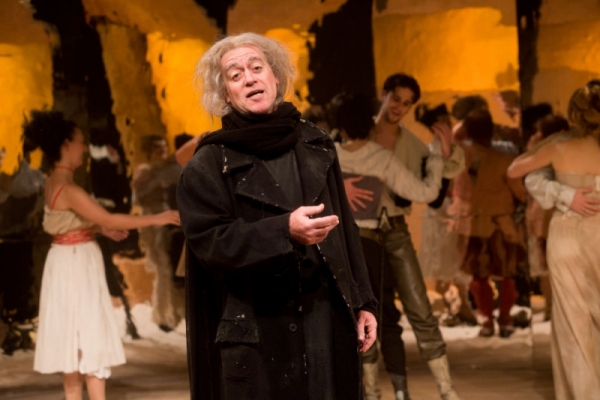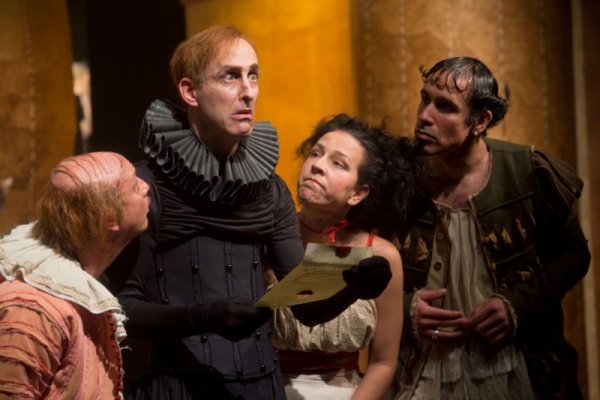
Shakespeare’s play is pure pleasure, as if the title – what you will – is a promise made to the audience, to serve the most delicious dish an audience might wish for , appealing to all the senses and fed on the most succulent fantasies, opening with the famous line: “If music be the food of love, play on.”
Yet, at the Khan, director Udi Ben Moshe has chosen to emphasize the darker undertones of this play, like the flavor shift from milk to dark chocolate, 70% cocoa. Ben Moshe begins with music, but, “What is love? ’Tis not hereafter” sings Feste, (lifting the song from Act II, scene III), opening the comedy with an intimation of death. Shakespeare does not tell us very much about Feste, stating only that he is a clown – leaving a lot up to the director. Ben Moshe and actor Yehoyachin Friedlander give us an older Feste: in black clothes adorned with a single red flower, his long gray locks witness to his advanced years, there is an aching poignancy to his song: “Then come kiss me sweet and twenty;/Youth’s a stuff will not endure.”
Of course, he does not sing those words precisely, as the play is in Hebrew translation – but the late Ehud Manor’s translation sings throughout, it’s simply beautiful. Miki Bencnaan’s set design of pillars and mirrors reflects the play’s doubling motif, and touch on the theme of how we see ourselves, projecting what we think we see, or would like to see, the way we imagine ourselves.
The relationship of image to reality is a central theme in this play of cross-dressing and disguise. Viola, washed ashore in Illyria, her twin brother’s fate unknown, decides to conceal her identity (an unaccompanied woman in Shakespearean times was not a desired situation). Disguised as a man, Cesario, she serves, and falls in love with, the love sick Orsino. Orsino can’t get through to his beloved Olivia, deep in mourning after her brother’s death, and sends Cesario in his stead, with hilarious results. The doubling in this play can make you dizzy – which is fine, because after all, it is a comedy.

The comic roles are wonderful and the actors revel in them. The drunken Sir Toby (Erez Shafrir) is sweetly funny, Maria (Irit Pashtan) is smart and practical with a bawdy sensuality to her stage presence, and Sir Andrew (Liron Baraness) is delightfully, hopelessly stupid and does a great moonwalk in tights. Malvolio, severe and snooty in a ruffled collar, is wonderfully ridiculous in his acrobatic exertions to smile – as Maria aptly says: “If this were play’d upon a stage now, I could condemn it as an improbable fiction.”
It’s a wild party and lots of fun, but it is Feste, the clown who would rather be a “witty fool” than a “foolish wit” who we take into our hearts. Shakespeare gives him the best lines, and the last words in this play, Ben Moshe puts him first, and Friedlander fulfills the promise of this role. Embracing life, he joins in every opportunity for silliness, whether a drunken night choir or tormenting Malvolio, yet is not deluded by appearances, seeing clearly the skull amidst the flowers, fruit and frivolity of this vanitas.
Future performances: April 17, 20, 21 & 26, 2011 at the Khan Theatre, 2 David Remez Square, Jerusalem. Tickets and information: call 02-6710281 or consult the Khan Theatre site.
Twelfth Night by William Shakespeare, translated by Ehud Manor
Director: Udi Ben-Moshe
Set Design: Miki Bencnaan
Costume Design: Polina Adamov
Music: Josef Bardanashvili
Lighting Design: Roni Cohen
Yehoyachin Friedlander: Feste – A Clown
Nili Rogel: Viola
Ariel Wolf: Orsino, Duke of Illyria
Itay Zvolon: Curio, A Gentleman attending on the Duke; Antonio
Irit Pashtan: Maria – Olivia’s woman
Erez Shafrir: Sir Toby Belch – Uncle of Olivia
Liron Baraness: Sir Andrew Aguecheek
Shimrit Lustig: Olivia – a rich Countess
Nir Ron: Malvolio – Steward to Olivia
Vitali Friedland: Sebastian – Brother to Viola
Itamar Gross: Keyboards
Arie Tcherner: Voice of Police Officer





